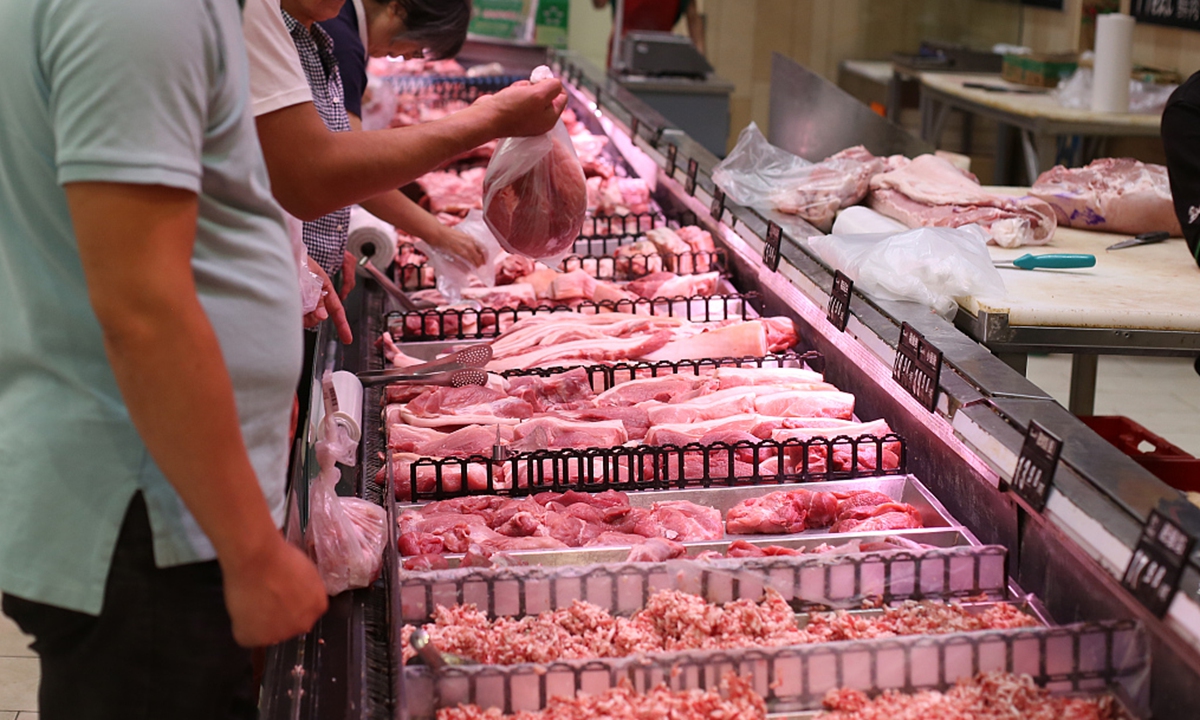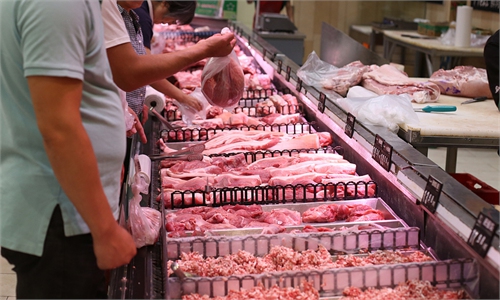China moves to curb surging pork prices amid concerns of impact on inflation
Nation has enough tools to stabilize market despite inflation concerns

pork Photo:VCG
China's top economic planning agency has moved swiftly over the past two days to curb surging pork prices, saying on Tuesday that it was considering tapping into central and local pork reserves to prevent rapid price hikes, following a meeting on Monday that stressed the crackdown on hoarding and other illegal activities behind the recent rise in pork prices.
The moves have already prompted positive responses from industry players. And experts said the Chinese government has ample tools to prevent pork prices from going up too fast as the staple is 95 percent self-sufficient, relieving worries that runaway pork prices could derail overall price-stabilizing efforts amid global inflation woes. Pork prices play a significant role in the country's consumer price index.
The National Development and Reform Commission (NDRC) announced via its official WeChat account on Tuesday that it is considering releasing the national pork reserves as well as guiding localities to jointly release reserves to prevent a rapid increase in pork prices.
Later on Tuesday, the NDRC also announced that it is working with the Dalian Commodity Exchange (DCE) to stabilize supply and prices of hogs via closer cooperation with the exchange and more synchronized regulation on futures and spot markets.
Attributing the price surge to irrational hoarding and over-fattening of animals by breeders on the basis of fabricated media reports of exaggerated price rises and demand shortage, the NDRC vowed to crack down on rumor-spreading, hoarding and speculation, as it believes the ample production capacity and slack pork demand makes the current rapid rise in pork prices "unreasonable."
The NDRC's announcement came after its Monday meeting with nearly a dozen pig breeders, in which it vowed to stabilize pig prices and crack down on price gouging. The measures had warning effect on the market on Tuesday.
On the Chinese A-share market, 21 pork-related shares slid by a combined 0.73 percent on Tuesday. At the DCE, the most-traded live hog futures slated for delivery in September also receded to 22,215 yuan ($3,313.5) per ton after surging to the daily limit to 22,755 yuan per ton in intraday trading, up 40 percent over its low in mid-March on Monday.
Pork prices have been on the rise in recent weeks. On Friday, the average pork price in China tracked by the Ministry of Agriculture and Rural Affairs was 24.55 yuan per kilogram, up 12.9 percent from the previous week. According to breeder Muyuan Foods Co's pig selling brief released on Tuesday, the price for hogs reached 16.53 yuan per kilogram in June, an 11.16 percent rise over the previous month.
Wens Foodstuff Group Co, another breeder, told investors via an online communication platform that the company will insist on a "stable production pattern, follow a scheduled plan and does not bet on market trends," in response to a query on whether the company will increase the number of pigs available for slaughter as prices surge.
A representative from Tech-Bank Food Co told the Global Times on Tuesday that it has not engaged in any withholding activities, adding that the company has predicted a rebound of pig prices may occur around mid or the second half of 2022, though the scale of the rebound cannot be predicted.
Wang Zuli, deputy researcher at the Institute of Agricultural Economics and Development of the Chinese Academy of Agricultural Sciences, told the Global Times on Tuesday that rising pork prices are reflective of a new pig cycle that is just on the ascending trend.
But Wang said the rapid increase is partly fueled by sentiment factors with perceived hoarding of hogs by farms, and rising demand from middlemen breeders that buy hogs from farms and fatten them before sale, due to an anticipation of further pork price hikes.
However, industry experts said that the Chinese government has sufficient tools, including the release of pork reserves it collected from the market a few months ago when prices were low, to prevent rapid rise in pork prices.
Wang said that as China is highly self-sufficient in pork supply, with 95 percent coming from domestic farms, concerns over pork price-induced inflation were minimal, despite the fact that the staple is the biggest food component in the consumer price index.
In September 2020, the price of pork was around 45.5 yuan per kilogram, but had dropped to around 16.7 yuan per kilogram by April.
Wang said that rising feedstock prices were already reflected by the current pork price hike, and predicted that the current round of price hikes will not reach the high recorded in 2020.


